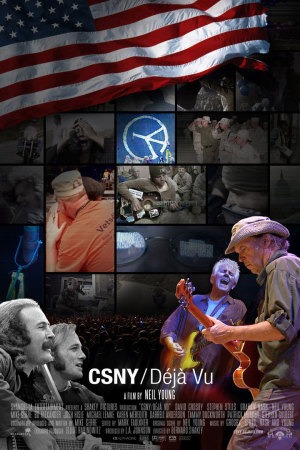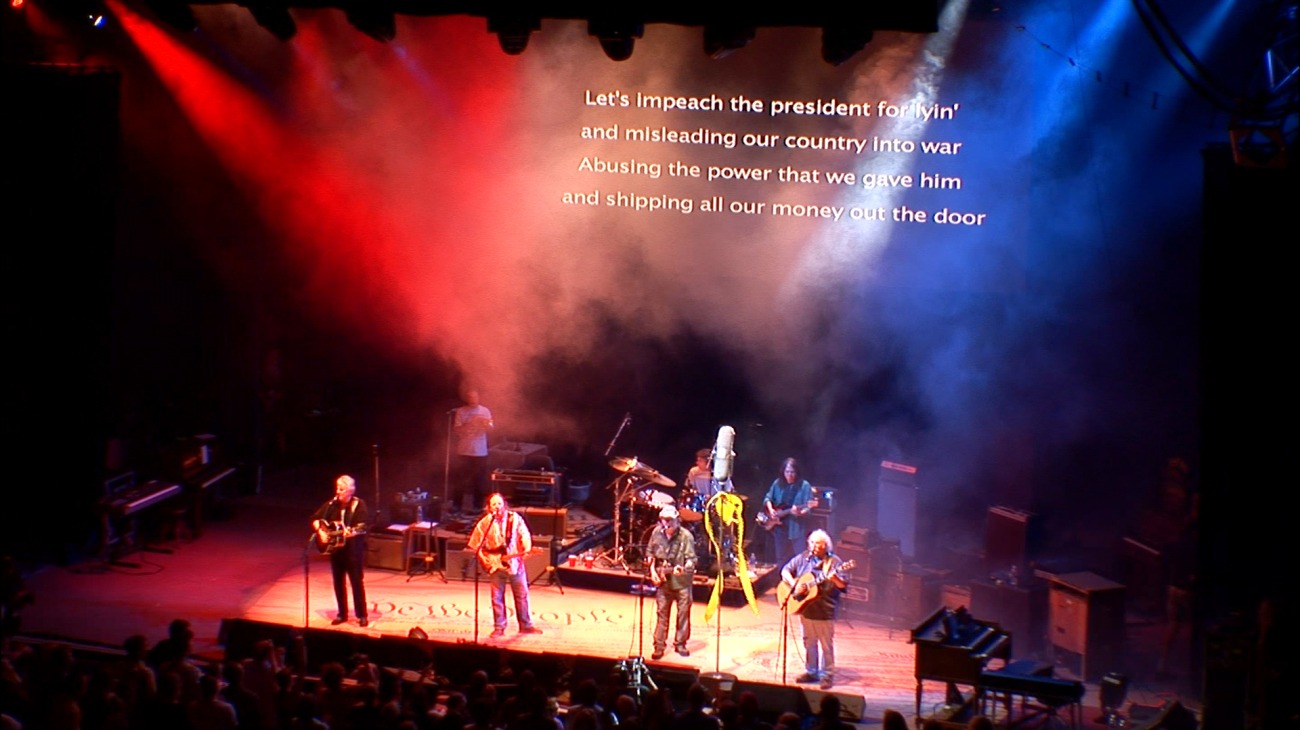
Neil Young is Neil Young in a Neil Young production of a film by Neil Young
Daniel Dennett once said, "There's nothing I like less than bad arguments for a view that I hold dear," which I largely agree with.* At this moment, I think I might refine it a bit, however: there's nothing I like less than a bad argument for a view that I hold dear, made by a person I typically respect. This is the thought that came upon me while I was watching the agitprop anti-war concert movie CSNY: Déjà Vu, directed by none less than "Y" himself, Neil Young operating under his nom de cine Bernard Shakey.
A quick history lesson: in May, 2006, Young released an album titled Living with War, written and recorded in a nine-day span less than a month prior. Comprised entirely of songs slamming the Bush administration for its sins, particularly those surrounding the 2003 invasion of Iraq (sample lyric: "Let's impeach the president for lying / And misleading our country into war"). A little while later, he managed to convince his sometime bandmates David Crosby, Steven Stills and Graham Nash to join him on a short tour 'round the country, whipping up anti-war and anti-Bush sentiment in preparation for the midterm elections in November. He asked political reporter Mike Cerre - formerly embedded in Iraq - to come along and record the goings-on of the tour for posterity, and now, two years later, Young has assembled it all into a movie chronicling the reception of anti-war sentiment in America from coast to coast and into the heartland.
The problem isn't, as you may suppose, that the film is stale, nor that it preaches almost exclusively to the choir; though certainly, in 2008, when only the dead-enders and possibly the insane still back Mr. Cheney's land grab, it's hard to see what purpose the documentary could serve, and agitprop movies only ever preach to the choir, whichever side of the debate. The big problem is that Young, though he be the writer of some of the finest, most trenchant, angriest political songs of the last fifty years, apparently has no skill at marshaling arguments in a cinematic context. There is no logical progression from thought to thought in CSNY:DV, no matter how compelling some of those thoughts should be; unless it is the logic of an ADHD-stricken teenager who can't follow an idea to its conclusion without pouncing on a dozen tangents along the way. Viewed from the broadest angle, the film seems organised according to a series of subheadings: first we get The Meaning of CSN, then Amerca's Views on the War and Veterans' Views on the War. But that frame is imposed from above by Young, not drawn out of the material, which is never as clearly defined as that scheme suggests.
Again, it's not that there's not some wonderfully interesting stuff inside all of it. Almost beyond question, the best sequence in the film follows Crosby, Stills, Nash & Young to Atlanta, the Deepest South stop on their tour, and the place they were most worried about. All goes well until they end the set with "Impeach the President", and the half of the crowd that doesn't stand up cheering at the top of their lungs storms outside to complain to Cerre's camera that there's no excuse for entertainers daring to have strong opinions about politics, and having the tremendous lack of tact to express those opinions. It's easily the sneakiest, best bit of commentary the film ever trots out, and only slightly for its look at the climate of America, c. 2006, in which people like Young and the Dixie Chicks are made pariahs for speaking truth to power. As much as any other band from the 1960s, politics and CSN&Y were inseparable; most obviously in "Ohio" and its B-side "Find the Cost of Freedom", both of which were loudly applauded in Atlanta and everywhere else, but in such radio-friendly megahits as Buffalo Springfield's "For What it's Worth." The smartest card CSNY: Déjà Vu plays is to point out that there's a whole back catalogue of songs that, prior to being overplayed to their deaths on classic rock radio, were just as incendiary in 1966 as "Impeach the President" was in 2006, and if you can't tell that CSN&Y were always politically motivated, it's because you're too happily ignorant to groove out to a tune whose lyrics you don't understand. It's one of the best arguments I've ever seen presented about the commodification of '60s pop culture I've ever encountered, primarily because it's rooted in a "now"-based perspective, not a nostalgic one.
Outside of that one great passage, the film veers from overly familiar to uncomfortably smug. I understand the merit of showcasing Iraq vets' understanding of Iraq, but it's not a new idea, and Young presents some 30 minutes of this material as though none of us ever realised that soldiers had personalities. That's not half as bad as the tremendous self-indulgence of the film's opening, in which the four star muse about how important they were, and how incredibly wonderful it is for the world that they've come back to save it (surprisingly, to me at least, Nash is much the most arrogant; Crosby has the good humor to observe, essentially, that if Young didn't poke the rest of them in the ass all the time, they'd be content to play their greatest hits at state fairs. "Benevolent dictator", I think is the phrase he uses). And none of it is presented in any real order; only vaguely thematic, not remotely chronological.
I don't doubt for a moment that Young means well, and Lord knows that I'm sympathetic to his political arguments (yes, let's impeach the president - and try to get him indicted for war crimes at the same time. Also, everyone should have their own lollipop unicorn). But a messy film is a messy film, and as much as I like Young's messy songs, that's just a whole 'nother art form. CSNY: Déjà Vu is what it is, and that's an urgent personal essay created by an untrained mad prophet with a camera. Cogent and meaningful, it ain't.
5/10
A quick history lesson: in May, 2006, Young released an album titled Living with War, written and recorded in a nine-day span less than a month prior. Comprised entirely of songs slamming the Bush administration for its sins, particularly those surrounding the 2003 invasion of Iraq (sample lyric: "Let's impeach the president for lying / And misleading our country into war"). A little while later, he managed to convince his sometime bandmates David Crosby, Steven Stills and Graham Nash to join him on a short tour 'round the country, whipping up anti-war and anti-Bush sentiment in preparation for the midterm elections in November. He asked political reporter Mike Cerre - formerly embedded in Iraq - to come along and record the goings-on of the tour for posterity, and now, two years later, Young has assembled it all into a movie chronicling the reception of anti-war sentiment in America from coast to coast and into the heartland.
The problem isn't, as you may suppose, that the film is stale, nor that it preaches almost exclusively to the choir; though certainly, in 2008, when only the dead-enders and possibly the insane still back Mr. Cheney's land grab, it's hard to see what purpose the documentary could serve, and agitprop movies only ever preach to the choir, whichever side of the debate. The big problem is that Young, though he be the writer of some of the finest, most trenchant, angriest political songs of the last fifty years, apparently has no skill at marshaling arguments in a cinematic context. There is no logical progression from thought to thought in CSNY:DV, no matter how compelling some of those thoughts should be; unless it is the logic of an ADHD-stricken teenager who can't follow an idea to its conclusion without pouncing on a dozen tangents along the way. Viewed from the broadest angle, the film seems organised according to a series of subheadings: first we get The Meaning of CSN, then Amerca's Views on the War and Veterans' Views on the War. But that frame is imposed from above by Young, not drawn out of the material, which is never as clearly defined as that scheme suggests.
Again, it's not that there's not some wonderfully interesting stuff inside all of it. Almost beyond question, the best sequence in the film follows Crosby, Stills, Nash & Young to Atlanta, the Deepest South stop on their tour, and the place they were most worried about. All goes well until they end the set with "Impeach the President", and the half of the crowd that doesn't stand up cheering at the top of their lungs storms outside to complain to Cerre's camera that there's no excuse for entertainers daring to have strong opinions about politics, and having the tremendous lack of tact to express those opinions. It's easily the sneakiest, best bit of commentary the film ever trots out, and only slightly for its look at the climate of America, c. 2006, in which people like Young and the Dixie Chicks are made pariahs for speaking truth to power. As much as any other band from the 1960s, politics and CSN&Y were inseparable; most obviously in "Ohio" and its B-side "Find the Cost of Freedom", both of which were loudly applauded in Atlanta and everywhere else, but in such radio-friendly megahits as Buffalo Springfield's "For What it's Worth." The smartest card CSNY: Déjà Vu plays is to point out that there's a whole back catalogue of songs that, prior to being overplayed to their deaths on classic rock radio, were just as incendiary in 1966 as "Impeach the President" was in 2006, and if you can't tell that CSN&Y were always politically motivated, it's because you're too happily ignorant to groove out to a tune whose lyrics you don't understand. It's one of the best arguments I've ever seen presented about the commodification of '60s pop culture I've ever encountered, primarily because it's rooted in a "now"-based perspective, not a nostalgic one.
Outside of that one great passage, the film veers from overly familiar to uncomfortably smug. I understand the merit of showcasing Iraq vets' understanding of Iraq, but it's not a new idea, and Young presents some 30 minutes of this material as though none of us ever realised that soldiers had personalities. That's not half as bad as the tremendous self-indulgence of the film's opening, in which the four star muse about how important they were, and how incredibly wonderful it is for the world that they've come back to save it (surprisingly, to me at least, Nash is much the most arrogant; Crosby has the good humor to observe, essentially, that if Young didn't poke the rest of them in the ass all the time, they'd be content to play their greatest hits at state fairs. "Benevolent dictator", I think is the phrase he uses). And none of it is presented in any real order; only vaguely thematic, not remotely chronological.
I don't doubt for a moment that Young means well, and Lord knows that I'm sympathetic to his political arguments (yes, let's impeach the president - and try to get him indicted for war crimes at the same time. Also, everyone should have their own lollipop unicorn). But a messy film is a messy film, and as much as I like Young's messy songs, that's just a whole 'nother art form. CSNY: Déjà Vu is what it is, and that's an urgent personal essay created by an untrained mad prophet with a camera. Cogent and meaningful, it ain't.
5/10
Categories: concert films, documentaries, mr. cheney's war, music, political movies






